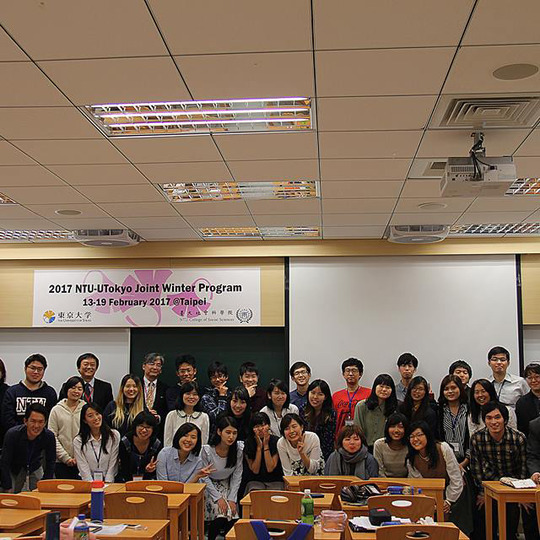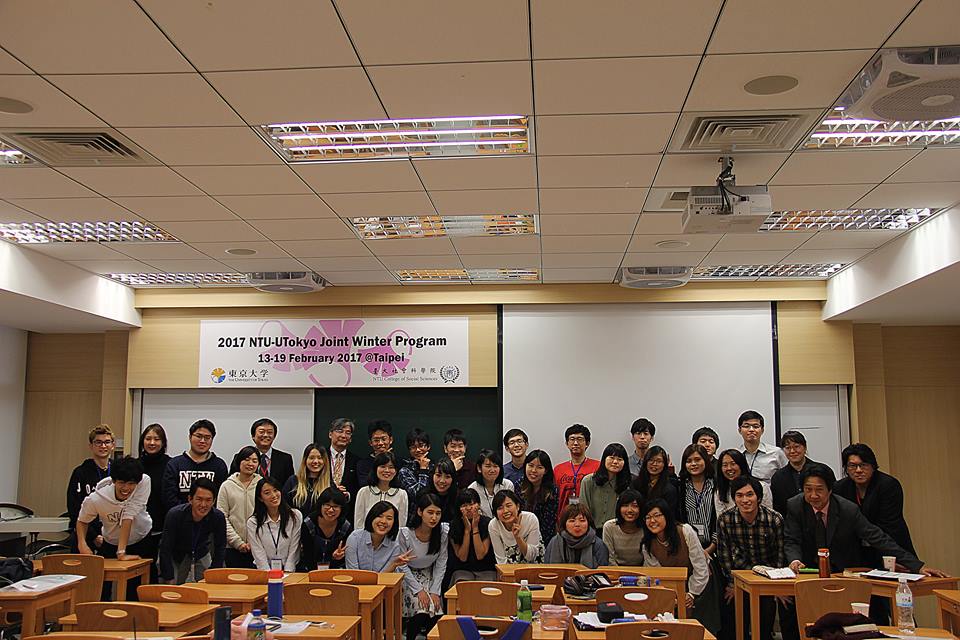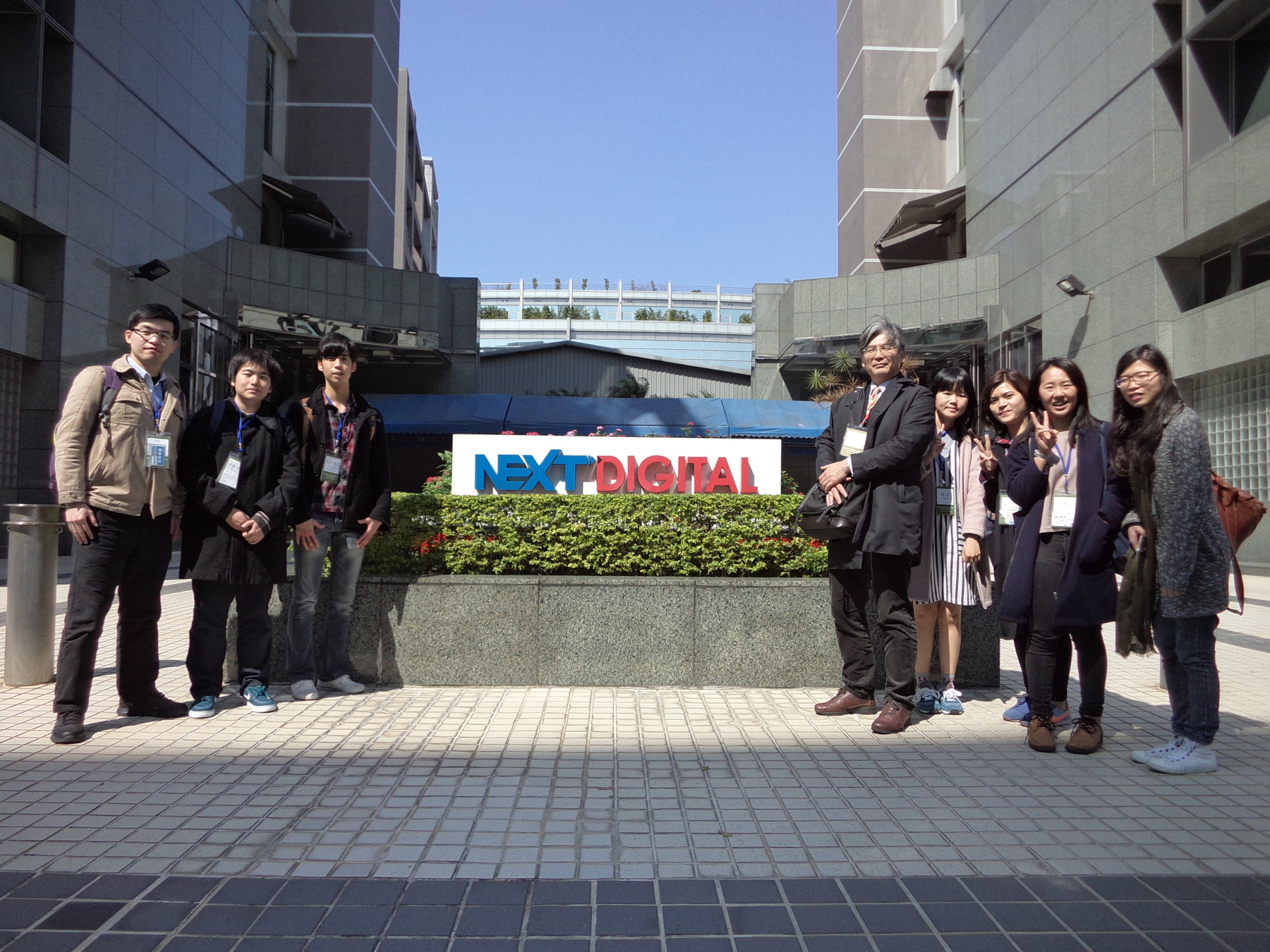
Report: 2017 NTU COSS × UTokyo Winter Program @Taipei Lige BAO, Yi-Ren LIN
- Time and Date
- February 12 (Mon.) to February 20 (Sun.), 2017
- Location
- National Taiwan University, Taipei
During this joint winter program, students were divided into five groups, lead by PhD students with different research interests (Civil Society & NGO; Media & Journalism; Economics & Industry; Urban Studies; Politics & International Relations). Each group had 3 students from the University of Tokyo and 3 from National Taiwan University, and every member in the group was required to take initiative in field projects whenever necessary, including preparing questions and proposing requests to project leaders (such as places/organizations to visit, etc).
As to the structure of the Program, on the first day (Feb 13) NTU arranged three lectures, so that the participants can have a general idea of the current situation of Taiwanese society and its past history. The lectures were “The Development and Features of Taiwan’s Civil Society Organizations: 1980-2016” by Professor Michael Hsin-huang Hsiao (蕭新煌); “A Brave New World: The Dynamics of International Institutions in a Post-Globalization Era” by Professor Hans H. Tung (童涵浦) and “The Japanese Industrial Policy in Taiwan and its Effects on the Post-war Development” by Professor Tsong-min Wu (吳聰敏). During February 14-18, each group conducted fieldwork separately, based on their research projects. Finally, on the last day of the program (February 19) presentations of fieldwork results were made by the groups.

Below are the summaries of activities by each group.
For Group 1 “Civil Society”, we chose education reform as a starting point to understand the role of civil society in Taiwan (led by Ms. Bao, IHS program student). The education reform starting from the 1990s played an important role in the social revolution in Taiwan, within which period the power of civil society could not be neglected. During our fieldwork, we interviewed key figures from the government, social groups and scholars. We also had the opportunity to visit Experimental Class at Xinpu, Taipei Media School, and Zhidao as examples of innovative education institutions. By analyzing the descriptions of their own activities, we got to know the role educational social groups were playing in the educational innovation and reform in Taiwan. In particular, we focused on how they defined “good citizen” in Taiwan; how the state, civil society and market power collaborated to make this reform possible; and what were the following puzzles they would face after these years of education reform.
For Group 2 “Media & Journalism” (led by Mr. Lin, IHS program RA), the research topic was “Journalism in the Internet Era”, emphasizing on how the work of media professionals has been changed by the prevalence of Internet use in Taiwan. The group visited Next TV, interviewing two journalists there, and also conducted 5 other anonymous interviews, including one university professor at the school of journalism, and 4 other so-called “online news editors” working for the websites of 2 national press and 2 TV stations. In the fieldwork, we realized that the traditional criteria to evaluate the quality of journalism, as well as the definition of “journalism” and “news” itself, have been changing gradually nowadays. In the past, journalism had been a specialized work proper to media professionals, who decided what was worth of reporting, and in turn of becoming “news” that could be accessed by the public. However in today’s Taiwan, journalists and editors rely heavily on online user-generated contents to produce “news”, making the line between professional journalism and online contents very much blurred. The result would be public distrust (sometimes even contempt) of the media professionals and the journalism itself.

For other groups, Group 3 (Economic/Industries) chose Dadaocheng (大稻埕) area as fieldwork site, exploring how the local economy was developed surrounding the famous matchmaking god Xia-Hai City God Temple (霞海城隍廟). Group 4 (Urban Studies) focused on several urban regeneration cases in western Taipei city, including Manga area (艋岬), Nanjichang Community building (南機場樂活園地), and Dihua street area (迪化街). Specifically, the Manga fieldtrip was guided by Homeless Tour (芒草心慈善協會), in which homeless people served as field guide for the program participants. Group 5 (Politics/International Relations) dealt with the changing diplomatic strategy of Taiwanese government after the Democratic Progressive Party (DPP) became the ruling party, having won both the Presidential and Congress elections in 2016. The group visited several official and unofficial organizations, including the Southeast Center at National Chengchi University (政治大學), Minister of Foreign Affairs, Taiwan Institute of Economic Research, and DPP Headquarter, etc.
This year’s NTU-UTokyo joint program is different from previous ones, mainly due to its research project-oriented nature. This makes the learning experience of individual participants very much focused on one specific topic, enabling the participants to gain deeper understanding of the issue. In addition, each research group was designed to make sure there would be high degree of diversity within the group. Factors such as gender, age, majoring subject, nationality, and even language proficiency were taken into consideration, so that students enjoy the experience of cultural diversity on a daily basis. However, it was also a pity that participants had little opportunity to interact with people outside of their own group; this was pointed out several times in the feedback session on the last day of the program. In the future, therefore, how to create connectivity between different groups, while at the same time maintaining the deep learning experience, may be a key to the further success of the program.
References
- http://www.u-tokyo.ac.jp/en/news/topics/topics_z1002_00004.html (UTokyo: English)
- http://www.u-tokyo.ac.jp/ja/news/topics/topics_z1002_00006.html (UTokyo: Japanese)
- http://www.coss.ntu.edu.tw/zh_tw/announcement/-%E7%A4%BE%E7%A7%91%E9%99%A2-2017%E8%87%BA%E5%A4%A7%E7%A4%BE%E7%A7%91%E9%99%A2x%E6%9D%B1%E4%BA%AC%E5%A4%A7%E5%AD%B8-%E7%9F%AD%E6%9C%9F%E8%81%AF%E5%90%88%E8%AA%B2%E7%A8%8B%EF%BC%8D2017-02-13-19-46764850 (National Taiwan University: Chinese)
report date : February 23, 2017
